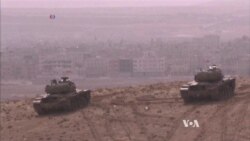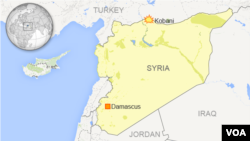Intense fighting is continuing between Islamic State and Kurdish forces around the Syrian town of Kobani on the Turkish border. The United States says it carried out at least nine airstrikes Friday against Islamic State [ISIS] positions. Meanwhile, the United Nations has warned that hundreds of civilians could be massacred if the town falls to the Islamic State. Kobani is a city with tremendously important strategic significance.
Three weeks into the Islamic State assault on Kobani, the militants reportedly have pushed deeper into the city.
U.S. airstrikes have slowed their advance, but fears are growing the city soon will fall.
Deep roots
The Kurds are defending the town for good reason, said Michael Stephens, head of the Royal United Services Institute in Qatar.
“The leader of the PYD, which is the biggest Syrian Kurdish party, was actually born in Kobani. He’s from there. And so there’s an emotional connection there, and there’s a political connection. It’s about signaling your determination to hold your de facto autonomous areas which you have won in this battle that’s been raging in Syria,” said Stephens.
Kobani was a test case for Kurdish autonomy, said Professor Ibrahim Sirkeci of Regents University in London.
“They set up communes there. So it was kind of a little self-rule case study,” said Sirkeci.
Urgent appeal
The United Nations special envoy to Syria, Staffan De Mistura, warned that the lives of up to 700 civilians still living in the city are at risk. He called on Turkey to allow Kurdish volunteer fighters into Kobani.
“We would like to appeal to the Turkish authorities in order to allow the flow of volunteers at least and their own equipment in order to be able to enter the city and contribute to a self-defense operation,” said De Mistura.
Kurds in Turkey have reacted angrily to Ankara’s stance and accuse the government of supporting the Islamic State. Riots in several cities have killed scores of people.
Kurdish separatists known as the PKK fought a decades-long war against the Turkish state, until peace talks began last year. Professor Sirkeci said Ankara is wary of strengthening the Kurds.
“If you support PKK or fight against ISIS today in northern Syria, that will mean directly strengthening the PKK, and making it a stronger party in the negotiations, particularly within Turkey as part of the peace process,” he said.
Turkey's calculations
Ankara does not share the Western view of the Kurds as allies, according to Stephens.
“They have made a calculation that ISIS and the administration of Kurdish Syria are both bad guys, and if ISIS wins it’s probably the lesser of two evils,” said Stephens.
He said allowing the fall of Kobani would backfire on Turkey.
“I think in the long run it’s a disastrous policy simply because there are two other Kurdish cantons [in Syria], much larger with much better defenses, which won’t be taken. And are those going to be friendly to Turkey in the future? Absolutely not,” said Stephens.
Turkey says any intervention in Syria must be done multilaterally with NATO partners -- and should include action against the government forces of Syrian President Bashar al-Assad. Analysts do agree that the situation is complex and there are no easy answers.







